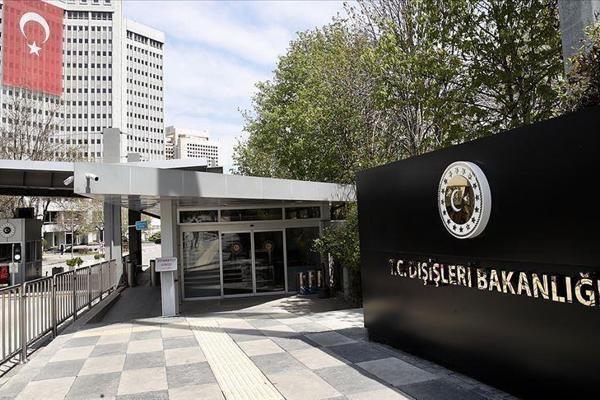Turkey criticizes EU’s 2020 enlargement report
ANKARA


The European Commission’s 2020 Enlargement Package prepared for all candidates and potential candidate countries was criticized by Turkey on Oct. 6 for reflecting a “biased approach” towards it.
“The 2020 report on Turkey reflects the EU’s biased approach, which is far from being constructive and has double standards,” the Foreign Ministry said in a statement.
“In this report too, the EU criticizes Turkey with baseless arguments while it does not mention its responsibilities and commitments that it has failed to fulfil. In particular, its biased, unfair and disproportionate criticism of Turkey’s foreign, security and economic policies as well as its governmental system, elections, fundamental rights, some judicial and administrative decisions and the legitimate measures taken against terrorism, shows how the EU is far from being objective,” the ministry said.
Turkey is a candidate country that adopts the negotiation process despite being blocked “by the narrow-minded attitude displayed by some EU parties,” the statement said, stressing that the country is committed to the EU membership process.
“It was expected of the commission to strongly stress this and not make discrimination in the candidate countries in its enlargement strategy and implementation as ‘Western Balkans’ and Turkey,” it said.
Eastern Mediterranean, Aegean, Cyprus
The statement also said the sections of the report on the eastern Mediterranean, Aegean and Cyprus issues are entirely based on Greek-Greek Cypriot claims. “This situation tarnishes the commission’s impartiality. We reject this biased and unlawful point of view that contributes neither to the solution of the Cyprus problem nor to the stability of the Aegean and the eastern Mediterranean.”
“Furthermore, the Greek-Greek Cypriot duo’s taking hostage of EU-Turkey relations to that extent estranges the EU from a strategic mind and vision while harming the EU’s interests. With no claim on the right of anyone, Turkey will continue to protect its rights and the rights of Turkish Cypriots,” the statement added.
Judicial progress
The statement underlined that the report did not mark the threats Turkey faces by the terror groups such as PKK/PYD/YPG, as well as FETÖ and ISIL.
“The language used in this section does not serve any other purpose than to please radicals in Europe who are against the EU and Turkey. Turkey acts in line with universal values, fundamental rights, security, democracy and the rule of law,” the statement said.
“In addition, the fact that the EU, which claims to be a power based on common values, has not opened the 23rd Judiciary and Fundamental Rights and the 24th Justice, Freedom and Security chapters to the negotiations is a serious contrast. Turkey does not expect praise over irregular migration management policy based on humanitarian grounds but the sharing of the burden and the fulfillment of all commitments of Memorandum of March 18,” it added.
Economic issues
In the report, Turkey’s economy was highlighted to cope with competitive pressure and market power within the EU, while some policies were criticized in terms of a functioning market economy criterion.
“Our country is highly integrated with the EU market in terms of both trade and investments and is directly affected by the economic problems in the EU and fluctuations in global markets,” the statement said.
“But Turkey is taking the necessary measures, coping to get through this difficult situation with the minimum damage, which the EU member countries are deeply affected. On the other hand, it is noteworthy that the EU stated that there was a decline in the areas related to the Customs Union, while it did not start the negotiations for its update,” it added.
Turkey determined to maintain harmonization with EU acquis
The statement stressed that the report showed Turkey’s overall harmonization level is good in 21 chapters, while it marks progress at various levels in 17 chapters over the last year.
“Level of harmonization mentioned in the report, despite the political obstacles Turkey faces during the accession process, is a clear expression of the will to maintain harmonization with the EU acquis,” the statement said.
“Our sincere desire is that the EU approaches Turkey, a candidate country, in larger and common interests of our continent, not in terms of selfish and parochial interests of certain parties, as well as developing and advancing Turkey-EU relationship in all dimensions in a membership perspective,” it added.
Political criteria of report
In the political criteria part of Turkey report, the EU said despite the lifting of the state of emergency in July 2018, the adverse impacts of the two-year-long emergency ruling continued to significantly impact on democracy and fundamental rights.
“Certain legal provisions granting extraordinary powers to the government authorities and retaining several restrictive elements of the emergency rule have been integrated into law. Key recommendations of the Council of Europe and its bodies are yet to be addressed,” said the report.
“In the absence of an effective checks and balances mechanism, the democratic accountability of the executive branch remains limited to elections,” said the EU, noting that under these conditions, the serious backsliding of the respect for democratic standards, the rule of law and fundamental freedoms have continued.
The report said political polarisation has continued to prevent constructive parliamentary dialogue and noted that parliamentary oversight of the executive has remained weak.
Ankara slams ECHR over interim measures
Turkey’s Foreign Ministry Spokesperson Hami Aksoy on Oct. 7 criticized a decision by the European Court of Human Rights (ECHR) to take interim measures against the country at the request of Armenia, which is locked in a conflict with Azerbaijan.
“The ECHR’s move dealt a blow to its credibility and reputation as it lacked a judicial basis, and the court did not even consult with the Turkish government,” Aksoy said in a statement.
“The ECHR’s decision was based on political, not judicial reasons,” he said, adding that the court was not aware of the realities on the ground.
